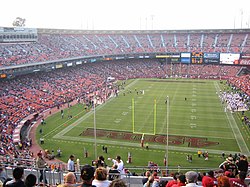| |||||||||||||||||||
| |||||||||||||||||||
| Date | January 3, 1999 | ||||||||||||||||||
|---|---|---|---|---|---|---|---|---|---|---|---|---|---|---|---|---|---|---|---|
| Stadium | 3Com Park San Francisco, California, U.S. | ||||||||||||||||||
| Favorite | 49ers by 3 | ||||||||||||||||||
| Referee | Gerald Austin | ||||||||||||||||||
| Attendance | 66,506 | ||||||||||||||||||
| TV in the United States | |||||||||||||||||||
| Network | Fox | ||||||||||||||||||
| Announcers | Pat Summerall and John Madden | ||||||||||||||||||
The Catch II was a National Football League (NFL) Wild Card Playoff game between the Green Bay Packers and the San Francisco 49ers on January 3, 1999. The game, which was played at 3Com Park in San Francisco, California, United States, became notable after a completed pass with 8 seconds left in the 4th quarter won the game for the 49ers. The 49ers, who had just lost the lead to the Packers late in the 4th quarter, were facing 3rd-and-3, when San Francisco wide receiver Terrell Owens caught a 25-yard touchdown pass from quarterback Steve Young, enabling the 49ers to defeat the Packers, 30–27. It came at the end of a 9-play, 76-yard drive engineered by Young.
Contents
- Background
- Game summary
- First half
- Second half
- Box score
- Analysis
- Aftermath
- Replay rule change
- Legacy
- See also
- References
- External links
This game and moment mirrors a similar catch in 49ers history, when quarterback Joe Montana threw to receiver Dwight Clark in the 1981–82 NFL playoffs, and is similarly regarded as one of the most memorable events in NFL history, and a significant moment in Owens's NFL career. Controversial decisions by the game officials led to rule changes related to challenging calls on the field and the use of instant replay. The game was the first postseason victory for the 49ers over the Packers in the previous four meetings and is an important part of the teams' rivalry.


